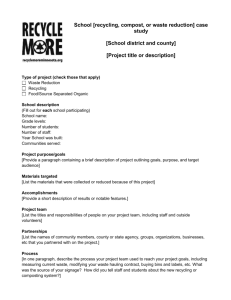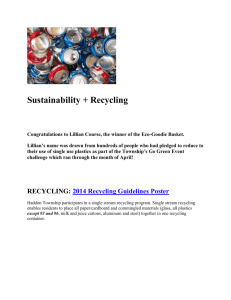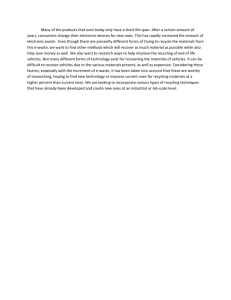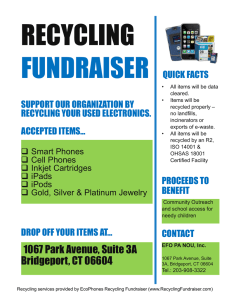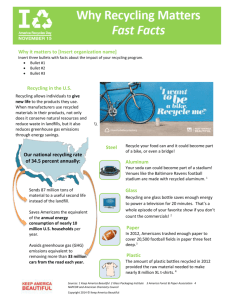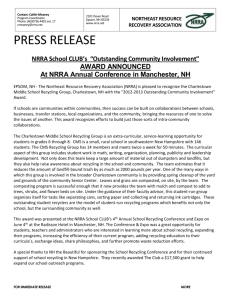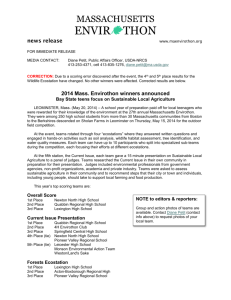Sep-2014-SNYCU - School Recycling Club
advertisement
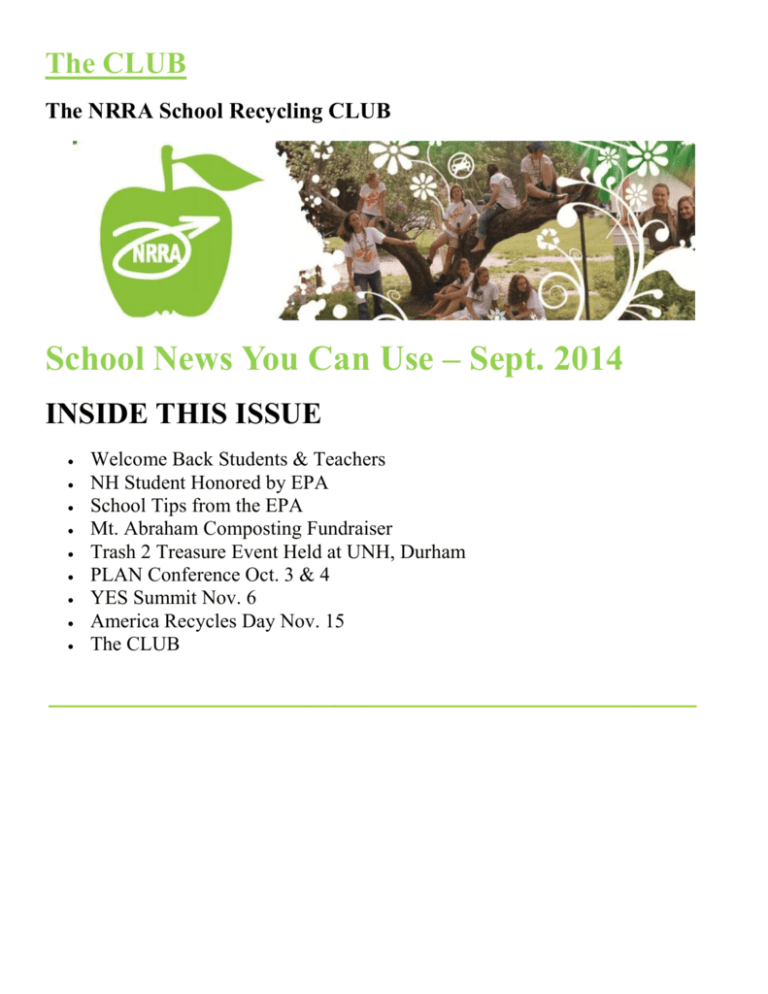
The CLUB The NRRA School Recycling CLUB School News You Can Use – Sept. 2014 INSIDE THIS ISSUE Welcome Back Students & Teachers NH Student Honored by EPA School Tips from the EPA Mt. Abraham Composting Fundraiser Trash 2 Treasure Event Held at UNH, Durham PLAN Conference Oct. 3 & 4 YES Summit Nov. 6 America Recycles Day Nov. 15 The CLUB ___________________________________________ Welcome Back Students & Teachers! As you begin your school year, this is an excellent time to initiate or upgrade your school recycling plan. Recycling includes (but is not limited to) bottles, cans, paper, cardboard, textiles, metals and food scraps for composting. The CLUB offers a variety of workshops and technical assistance geared for all ages. We also offer discounted recycling products to meet your needs. Feel free to contact The CLUB – we can help you get started! Workshops: Garbage Guerillas Healthy Home/Clean Waters Waste=Global Climate Change Back to the Earth Recycling & Composting in Your Town Technical Assistance: Trash On The Lawn Day (TOLD) Green Cleaning & IAW Evaluation & Review STAR Assessment Does your School have an individual, program or an event that deserves recognition for outstanding work in recycling? Click here and fill out the nomination form telling us all about it! NRRA and the NRRA School CLUB will be giving out awards in each category listed below at our 5th Annual School Recycling Conference/33rd Annual Conference & Expo on June 10th, 2014 at the Center of NH/Radisson in Manchester, NH. For more information about the conference go to http://www.schoolrecycling.net/conference/ School Recycler of the Year Rookie Recycler of the Year Best Composter Most Profitable Recycling Program Outstanding Recycling Fundraiser 2013-14 Student Recycler of the Year Outstanding Recycling Innovation in a School Outstanding Community Involvement Facilities Staff Recycler of the Year Teacher Recycler of the Year Cafeteria Staff Recycler of the Year Best Earth Day/Recycling 2013-14 Event ____________________________________________ MAKE A DIFFERENCE AT YOUR SCHOOL Textiles: A big part of the tonnage for trash is textiles that get thrown out. The CLUB is convinced they can help schools capture textiles before they are discarded and being charged $90 on average for trash (including transportation), when they can be picked up and the schools can get paid $100 per ton ($.05 per lb) for the same material. That is a difference of $190! Contact the CLUB at 736-4401 x 17 or theclub@nrra.net for information how you can get paid for your “trash”. ************************************ Trayless Tuesdays! How it all started: In March of 2010 The Department of Education (DoE) replaced Styrofoam trays with paper boats in all NYC school cafeterias on all Tuesdays. The Tuesday menu changed as well. SchoolFood serves only non-saucy foods, like sandwiches on this day to help keep the paper boats clean enough to be acceptable for recycling. Many schools are now using the paper boats on Fridays (for pizza) and for all breakfast meals. The paper boats used on Trayless Tuesdays are recyclable if they are “clean and dry.” If the boats are covered in ketchup, or other food waste, they should be put into the landfill trash bin. Recycled Paper Boats go into the bins marked “paper” or, “recycling”. Trayless Tuesdays reduces Styrofoam tray use by 20% Why Reducing the Use of Styrofoam is Important: In production it is hazardous for workers and creates hazardous waste; 40 years of studies show that styrene leaches from containers into our food; After a usage time of about 30 minutes, whether incinerated, landfilled, littered, or recycled, will leave a trail of toxic particles that will last forever; It is lightweight and brittle and often ends up as littler; even when you think it has been properly thrown “away”; It is a major source of marine debris, breaking into down into tiny pieces, killing birds and marine mammals who think this is food. It is becoming a part of our seafood chain (read more about this from 5 Gyres Institute) More and more businesses located in middle to high income neighborhoods don’t even use foam containers anymore. Yet, in low income neighborhoods, foam to-go ware is litter-ally EVERYWHERE. Recycling polystyrene is NOT A SOLUTION. In 2008-09, NYC tried a foam recycling pilot and it failed because containers need to be cleaned first and there is no major market for the recycled material. What happens to these new styrene-based products at the end of their life cycle? For more information on Trayless Tuesdays visit cafeteriaculture.org or contact the CLUB at theclub@nrra.net or 1.603.736.4401 ************************************ Yes, cartons are recyclable! Made mainly from paper, a renewable resource from responsibly managed forests, cartons are in demand to be recycled into new products. Whether you’re a school administrator, food service director, teacher, facility manager or a parent volunteer, the Carton Council can provide you with the information you need to start a carton recycling program at your own school. We’ll provide the “why” and the “how” of school carton recycling, and give you the tools you need to make the program a success. The Carton Council can also provide technical assistance from one of our school recycling coordinators. The Carton Council is committed to increasing carton recycling in the United States. By promoting both recycling technology and local collection programs we work to limit the number of valuable cartons that end up in a landfill. Visit RecycleCartons.com or click here for the Carton Recycling in School Program Start-Up Guide ____________________________________________ CONFERENCES, AWARDS & CONTESTS The Green Schools National Conference is March 26-29, 2014 The 4th Annual Green Schools National Conference is March 26-29 in Sacramento, California. The Conference is the nation’s largest gathering of green, healthy and sustainable K-12 school leaders and learners. Some 1,500 teachers, parents, principals, superintendents, food service directors, facilities managers, and other partners are expected to attend. Topics will include sustainability skills and knowledge for the 21st century; stewardship and service learning; sustainable facilities design and management; health and wellbeing; and creating strong partnerships and networks. Click here for more information. ************************************ North America Envirothon Do you want to excite your students about the outdoors? Do they love nature and the natural world? Do you want to help connect them to the natural resources in their community? If you answered “YES!” to any of the questions above, we would like to invite you to help them participate in Envirothon. Envirothon helps students focus on local and global environmental issues related to aquatics, forestry, soils and wildlife resources through real-world learning in a teamwork environment. It is co-sponsored by a variety of agencies and organizations working in natural resource conservation. The program provides an opportunity for hands-on field experiences and activities with professionals in the field. It’s a way for high school-aged students to actively learn more about the natural world around them while they work together. Students learn to incorporate science- based investigations in helping to explore environmental issues. OK, you say. My students might be interested…What’s the deal? An Envirothon Team consists of five students plus one alternate who are mentored by a coach. A coach can be a teacher, school administrator, youth group leader, or even a parent who has an interest in working with young people and natural resources. (Your entire class or group can participate in learning about your States natural resources by participating in the program. However, only 2 teams per school/group can compete at the event in May. Additional students can participate as alternates.) Once a team is formed, teams register by filling out the form on the back of this brochure and sending it in with a check for the appropriate amount. You will then receive resource materials that cover the four main areas of the Envirothon: aquatics, forestry, soils and wildlife. There will also be information on a fifth area called the “Current Issue.” This is a real-world issue or problem that the environmental community is attempting to solve that relates to all of the four main interest areas of the Envirothon. The job of an Envirothon coach is to help the team learn the concepts and lessons provided in the materials as well as aid them in preparing a communitybased project/speaking presentation on the current issue. Registration is suggested as soon as possible to provide maximum time for preparing for the culminating event. To help you coach, we can connect you with resource professionals who can offer to take you out in the forests and fields to look closer at the concepts you are learning. A training day for all Envirothon teams takes place in April providing you with the opportunity to meet other coaches and high school level students who are also interested in the natural world. At the event in May the team that demonstrates the greatest overall knowledge is selected to represent their state at the North American Envirothon, held this year at University of Georgia in Athens, GA from July 20-24, 2014 For information more information on Environthon and specific state Environthon programs choose from the links below: General Envirothon Information - http://www.envirothon.org/ Connecticut Envirothon – http://www.ctenvirothon.org/ Maine Envirothon – http://www.maineenvirothon.org/ Massachusetts Envirothon – http://www.maenvirothon.org/ New Hampshire Envirothon – http://nhacd.org/wordpress/envirothon/ Rhode Island Envirothon – http://www.rienvirothon.org/ Vermont Envirothon – http://www.vacd.org/envirothon ____________________________________________ FOR YOUR INFORMATION Researchers Work to Protect Winter from a Changing Climate 2013 By Katie Lubinsky December 18 I am not a winter person. In fact, I would prefer 80-degree weather all the time. However, as much as I complain and begrudgingly deal with cold weather, I understand its importance for ecosystems and the climate (and that I also cannot escape it unless I travel between hemispheres). Many are asking whether we’ll lose some of our winter in the coming years. Despite cold periods, researchers report that ‘warmer than usual’ days are outnumbering ‘colder than usual’ ones. One pollutant that is contributing to rising temperatures is black carbon, an air pollutant that may not be as well known to the public as carbon dioxide. Often referred to as soot, black carbon is made up of tiny, black-colored particles that are part of particulate matter (PM). The particles are emitted from fossil fuels, biofuels, and biomass, and are the strongest light-absorbing component of PM. Black carbon particles can absorb a million times more energy than carbon dioxide while up in the atmosphere. These particles have an enormous affect on climate change. By directly absorbing light and heat from the sun and earth, black carbon can warm the atmosphere, and, in turn, directly raise temperatures. What’s more, the pollutant can also reduce the ability for snow and ice to reflect light, primarily at the Poles and Himalayas (the albedo effect); thus, causing the snow and ice to warm and essentially melt faster. EPA researchers and grantees are studying the amount of black carbon being emitted from primary sources such as diesel engines as well as ways to reduce the impact of the pollutant on climate change. A recent EPA-funded report by the Health Effects Institute shows that the Agency’s emissions standards for new diesel engines reduce emissions, including black carbon. Cookstoves, another high-emitting source of black carbon, are used in many developing countries for cooking food and heating. This results in harmful health effects from poor indoor air quality, particularly for women and children who spend significant time in smoky homes. EPA is testing new and improved cookstoves that reduce emissions and use less polluting fuels and alternative energy, like solar power. Progress to reduce black carbon has been made. One study indicates that there has been a 32 percent reduction in black carbon emissions from U.S. mobile sources between 1990 and 2005, according to the Report to Congress on Black Carbon (download at: http://www.epa.gov/blackcarbon/). EPA’s black carbon research is making important contributions to international efforts to reduce this air pollutant. Researchers are optimistic that by reducing black carbon, significant progress can be made in battling climate change. This is good news for those who love winter, snow and outdoor winter sports like snowboarding and skiing. Though I will continue to brace myself before venturing outside in the cold months, I also appreciate the changing seasons and the research that is being conducted to reduce black carbon’s threat to our climate. ____________________________________________ THE CLUB What CLUB programming can do for your school! Improves academic performance, especially in science and math Can lead to financial savings for schools Decreases the school’s carbon footprint through practical solutions that reduce energy and water consumption Reduces school waste and conserves natural resources Encourages student environmental awareness and stewardship Increases parental involvement Helps students and teachers develop stronger relationships with their communities Previous EPA EE-funded research at over 200 New England schools completed by the NRRA School Recycling CLUB (the CLUB) found that the single most challenging area for school recycling programs was in providing curriculum integrations that brought recycling and sustainability into classrooms to be used as the subject matter for meeting state and local curriculum standards. The intention of the CLUB programs is to address just that issue in schools across all six New England states. Our hope is to use the CLUB’s workshops and technical assistance programs, all experiential and hands on, as a tool for educating K-12 students about consumption, proper diversion of waste, the resulting impacts on climate change and what they can do to change it. Through these offerings, we are also afforded the opportunity to link these priorities to curriculum standards. In addition, these workshops will model, for educators or community leaders, exemplary ways of teaching in creative, effective, and efficient methods about human health threats from environmental pollution as well as how to minimize human exposure to preserve good health. Click here to learn more or contact us at theclub@nrra.net or call 1.603.736.4401 ext. 17 WHAT IS YOUR SCHOOL CLUB UP TO? The NRRA School CLUB always loves to hear what its members are doing to recycle and help the environment so we can share it with our other members. There are so many different things being done, and you are our best source of information and what is working in your school. It can be a new program, a long-term project that’s been proven over time, a field trip, etc. Always feel free to contact me or submit something and you may see it in the next School News You Can Use! Caitlin theCLUB@nrra.net 1.603.736.4401 ext 17 Meaney
